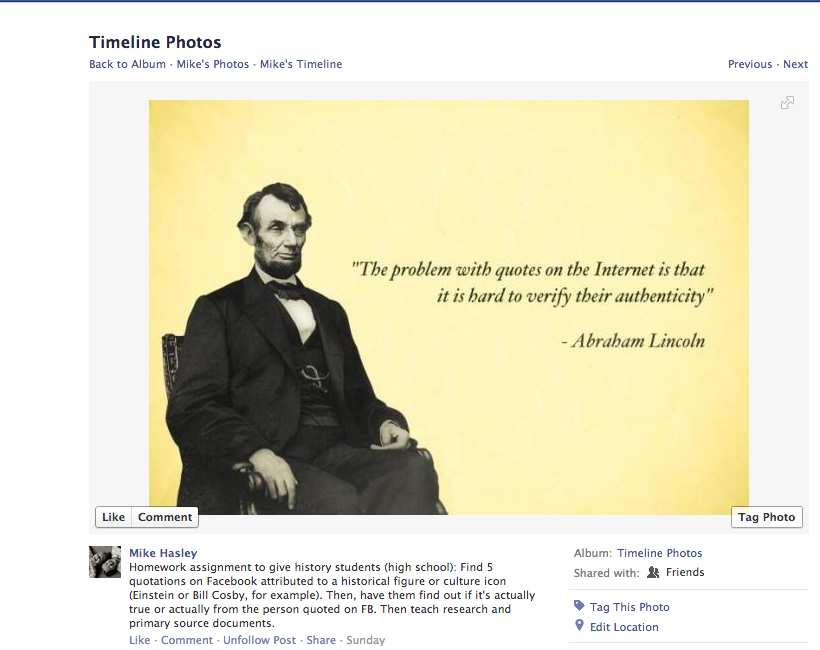Mike Hasley, our Social Studies specialist posted the image/assignment above in FaceBook the other day.
Homework assignment to give history students (high school): Find 5 quotations on Facebook attributed to a historical figure or culture icon (Einstein or Bill Cosby, for example). Then, have them find out if it’s actually true or actually from the person quoted on FB. Then teach research and primary source documents.
-Mike Hasley
I wrote something vaguely annoying, as is my usual pattern in life and on social media. See below. That’s why I have no friends in real life and only 6 on social media.
That phrase seems to imply you can easily verify the truth of quotes not on the Internet…
The problem w quotes is that they’re often out of context, misattributed, mangled, or used to prop up shoddy arguments.-Tom Woodward
This has been bouncing around in my head since that post and started to solidify into something more expansive as I listened to the Radio Berkman podcast #193- Facts are Boring. This whole podcast is focused on truth, fact, and evidence. Given my historical interest in how gray1 “truth” is, the potential for greater understanding of the use/misuse/power of quotes in popular culture is very attractive.
I’d want to look at the historical use of quotes. Have things changed dramatically with the introduction of the Internet? This link, 10 Famous Quotes Everyone Gets Wrong, actually showed up in Facebook from an English teacher I used to work with immediately after Mike’s post. Mix it with this recent Boing Boing post on Occam’s razor, this Bill Cosby non-quote going around, the Berkman podcast, and you not only have a decent foundation for arguing people have always misused quotes but you also have a strong rationale for a diverse RSS feed and friends who don’t use Snopes on FB.
Brother Ockham, however, said nothing of the kind. Later philosophers have put these words into his mouth for their own convenience.
Here is what he wrote, according to the Stanford Encyclopedia of Philosophy:
“Nothing ought to be posited without a reason given, unless it is self-evident or known by experience or proved by the authority of Sacred Scripture.”
-via Boing Boing
Given that a quote, by definition, is exactly what person said/wrote you get into some really fun stuff. I like Mike’s idea of having students gather some quotes but I want to expand on the analysis and broaden it to include both current day and longer term mistakes around quotes. I want to focus on why people use quotes at all and how then move into the ways people misuse them. What drives intentional misuse? What leads to accidental misuse?
It seems there are at least a few different ways to misuse quotes- there are misattributions (right quote, wrong person), misquotes (mangled words, right person), contextual lies (right words, right person, but so devoid of context that it is false), and maybe misreads (right person, right words, wrong idea2).
You have some nice overlap with propaganda and persuasive elements as well as the evaluation of primary source documents. I might work in the idea of troll quotes into this with an emphasis on how knowledge of the audience allows the greatest degree of provocation. How does that knowledge inform your analysis of other misquotes?
Just seems like a lot of interesting potential on the English and cultural side with a decent opportunity to mix in history as well. It was also interesting to me just how many pieces of media from such differing sources came together in a fairly short period of time around this topic.
1 including how to spell grey in my head- possibly influenced by Gandalf the Grey
2 Frost’s The Road Not Taken is a decent example. Even if you argue about the meaning, it seems the way it’s used in every yearbook is not the intent.


Thanks… .first time on Google Reader in a while. Darn work.